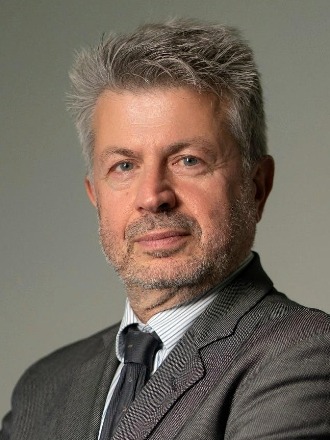Bringing citizens, industry, and AI together in interdisciplinary research

Artificial intelligence (AI) is being used in more and more areas, including industry. But how can we develop algorithms that are technologically advanced without losing sight of human values and practical applications? In this episode of JTS Scholars, Christos Emmanouilidis, Associate Professor at the University of Groningen, discusses the collaboration between the university, industry, and societal partners in research on human-centered AI.
Text: Eline Vermeulen (Master’s student in Science Communication at the University of Groningen)
About the JTS Scholars
A ‘JTS Scholar’ is a researcher (from postdoc to professor) affiliated with the University of Groningen who conducts research in fields related to the Jantina Tammes School: digitalization, digital technologies and artificial intelligence. In this series, we interview our Scholars about their expertise and future plans for interdisciplinary collaboration.
You can read the other interviews on our overview page.
Emmanouilidis has long been interested in the societal aspects of artificial intelligence. ‘When you talk to AI scientists, the conversation quickly turns to technical details: how well the system performs, how accurate it is, how robust it is. But this overlooks an important aspect, the social impact of AI. That is why we also want to focus on human well-being.’
Benefits for Industry
As a researchers, Emmanouilidis is involved in several projects in the field of Human-Centric AI. These projects focus on designing, developing, and evaluating AI solutions with special attention to human well-being. At the same time, it is essential that the technology functions reliably and offers practical applications. His projects within this domain are diverse, ranging from improving industrial production processes to promoting effective collaboration between humans and AI.
In his research, Emmanouilidis integrates social, operational, and technological aspects of artificial intelligence. The technological side focuses on how AI systems function. ‘Systems must be technically robust, otherwise people lose trust in them. But even if the technology works well, companies will not invest in it unless it delivers benefits,’ he explains. That is why the operational side is also crucial: AI must produce tangible results, such as higher productivity in industry.
Unjust Outcomes
Societal aspects such as inclusivity are also of great importance, according to Emmanouilidis. In his work, he not only looks at the impact of AI on individuals and businesses but also at its broader implications for society as a whole. ‘Data can ignore general knowledge, overlook norms and values, and introduce or reinforce biases,’ he warns.
As an example, Emmanouilidis mentions the COMPAS algorithm used in the U.S. judicial system. This algorithm assigned risk scores to convicted individuals to predict the likelihood of reoffending. Although designed to increase efficiency, it resulted in discrimination. ‘In identical cases, Black Americans were less likely to be released than white Americans,’ he explains. ‘The algorithm amplified the biases already present in the data. That data actually reflects the biases within ourselves. When we rely solely on such data and lose sight of the human context, it ultimately leads to unjust outcomes.’
Broad Collaboration
It is clear that these topics extend beyond Emmanouilidis’ own faculty, the Faculty of Economics and Business (FEB). ‘Our projects share one thing in common: they have overarching applications across multiple disciplines. I saw the need to bring together different faculties and disciplines. That is why I took the initiative to explore opportunities within the Jantina Tammes School of Digital Society, Technology & AI (JTS).’
As a JTS Scholar, Emmanouilidis is helping to establish a new project, an interdisciplinary ELSA Lab for Technical Industry (ELSA4TI). The project integrates ethical, legal, and social aspects of AI. ‘The university already has an ELSA Lab for healthcare,’ he says enthusiastically. ‘But not yet for the technical industry. It felt like a logical next step to continue our previous work on Human-Centric AI in an interdisciplinary way within our university, and specifically within JTS.’
According to Emmanouilidis, the JTS is all about multidisciplinary collaboration and bringing faculties together. ‘That is exactly what we are doing in ELSA4TI.’ The project brings together major industrial partners and the faculties of Science & Engineering, Law, Economics and Business, and the University Medical Center Groningen (UMCG). Ming Cao, the scientific director of JTS, leads the project. ‘So we have four faculties collaborating on this project, which is fantastic.’
This collaboration with industry also aligns with another pillar of JTS: cooperation with societal stakeholders. ‘That means involving organizations that have specific technological needs, such as Philips,’ he explains. Emmanouilidis emphasizes that we need not only a multidisciplinary vision but also a multi-stakeholder vision. He points to other key partners. ‘In the so-called SkillAIbility project, for example, we collaborate with the European Union of the Deaf to design an inclusive workplace using AI.’
It is clear that there is still much to explore in the world of AI. Emmanouilidis has a long-term vision. ‘We need to understand the limits of AI and guide it more effectively toward outcomes that are valuable for individuals, organizations, and society. To achieve this, we must begin to see AI as a teammate in our daily tasks and invest in the right kind of research.’
More news
-
15 September 2025
Successful visit to the UG by Rector of Institut Teknologi Bandung

